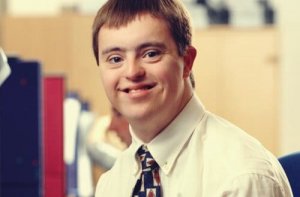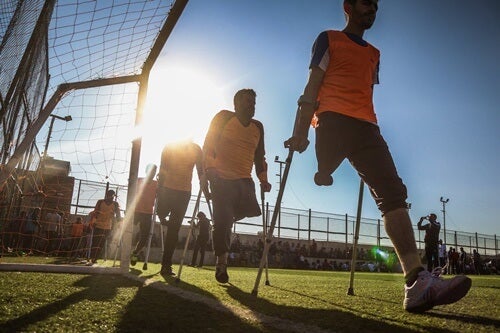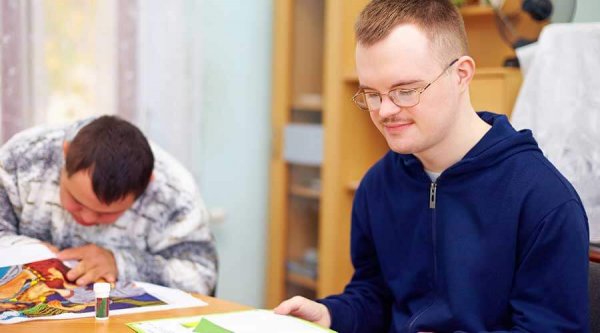People with Disabilities: Looking to a More Inclusive Future


Written and verified by the psychologist Valeria Sabater
People with disabilities are the largest “minority” in society. According to the WHO, about 15% of the world’s population has a limitation that hinders their proper functioning in their daily lives.
This broad group demands, above all, a change of perception and a clearer vision about them, based on reality. They want to know how they can have a more inclusive future along with the rest of society.
When we talk about this remarkable sector of our society, it’s common to hear terms such as “disabled” or “handicapped”. Some countries even use the term “invalid”. However, society needs to learn that the choice of words matters. Language gives visibility and, therefore, defines what happens around us.
Thus, to begin, something that they would ask of us all is that we speak of them as simply people with disabilities. This way, we avoid negative connotations.
These terms are much better suited because, this way, we can talk about them as people whose functionality is limited by a specific problem.
However, thanks to the latest resources, such as technical support or specially-designed products, their limitations are no longer that extensive. Moreover, sometimes, this disability only really comes to the fore because specific places haven’t made the necessary adaptations and changes to be able to accommodate them correctly. Some people and places just don’t know how to react or respond to disabilities and aren’t willing to provide what they all yearn for: inclusion.
“The only disability in life is a bad attitude.”
-Scott Hamilton-

People with disabilities: not different, just with specific needs
Every 3rd of December is celebrated as a special day to remember people with disabilities. This is done in an attempt to promote the rights and welfare of this group. It’s essential that society doesn’t only provide adequate resources to every man, woman, and child who’s in a vulnerable situation. This is a great first step but there’s still a lot of work to do in other areas.
We can highlight the fact that people with disabilities don’t have much public visibility. In the world of culture, business, and politics, there aren’t many names that come to mind. We would love to have leaders, film directors, or artists with disabilities.
One remarkable example is Stephen Hawking, who, despite suffering from ALS (amyotrophic lateral sclerosis), was able to advance in his career and become a renowned figure in his field. We need to empower these people much more to create a more inclusive and impartial future where we don’t neglect third world countries either.
On the other hand, the WHO’s report points out a number of areas in which we should reflect on the current situation of people with disabilities. Let’s delve deeper into this.
Facts about people with disabilities
- More than a billion people live with a disability. Therefore, they’re the largest “minority” in our society.
- Disability issues have a major impact on the poor.
- The medical care they receive isn’t always the most appropriate.
- These people are at a greater risk of experiencing abuse, both physical and psychological.
- Children with disabilities are more vulnerable than children without physical, intellectual, or developmental problems.
- Having some kind of disability means having fewer employment opportunities.
- Something as basic as receiving resources, rehabilitation, and social and medical support completely changes the lives of people with disabilities.
- People with disabilities have difficulty integrating into their communities and participating in daily activities.

What do we need to do to promote a real and effective inclusion of people with disabilities?
People with disabilities aren’t disabled people. They’re people who have limited functionality in a particular area and who, with adequate resources, could even function normally.
But how can this be achieved? What can society do to guarantee their inclusiveness? Here are some key points.
They need support, not just care; respect, and not pity
A person with a disability doesn’t expect you to care for them (at least not in every case), nor do they expect you to monitor their every step and always come to their rescue. What they want and need is the means to take care of themselves as much as possible. They want autonomy and the same opportunities and rights as anyone else.
Therefore, if society limits itself to seeing only the differences, then it’s discriminating against them. Awareness is certainly the first step towards inclusion.
Social and political support
Governments and public bodies should mediate in the following strategies:
- Firstly, facilitating access to any service or building in the community.
- Facilitating access to proper employment for this group, avoiding any discrimination.
- Also, improving education through adequate resources and support for children with disabilities.
- Encouraging research to improve the lives of people with disabilities.

In conclusion, this large and important group of our society shouldn’t need us to have a day on our calendar to remember them.
Apart from the 3rd of December, there are also 364 other days in a year. Perhaps they’re waiting for their first job, waiting for a support teacher in their classroom, and also dreaming of having a full and happy life like any of us…
This should give us plenty to think about!
People with disabilities are the largest “minority” in society. According to the WHO, about 15% of the world’s population has a limitation that hinders their proper functioning in their daily lives.
This broad group demands, above all, a change of perception and a clearer vision about them, based on reality. They want to know how they can have a more inclusive future along with the rest of society.
When we talk about this remarkable sector of our society, it’s common to hear terms such as “disabled” or “handicapped”. Some countries even use the term “invalid”. However, society needs to learn that the choice of words matters. Language gives visibility and, therefore, defines what happens around us.
Thus, to begin, something that they would ask of us all is that we speak of them as simply people with disabilities. This way, we avoid negative connotations.
These terms are much better suited because, this way, we can talk about them as people whose functionality is limited by a specific problem.
However, thanks to the latest resources, such as technical support or specially-designed products, their limitations are no longer that extensive. Moreover, sometimes, this disability only really comes to the fore because specific places haven’t made the necessary adaptations and changes to be able to accommodate them correctly. Some people and places just don’t know how to react or respond to disabilities and aren’t willing to provide what they all yearn for: inclusion.
“The only disability in life is a bad attitude.”
-Scott Hamilton-

People with disabilities: not different, just with specific needs
Every 3rd of December is celebrated as a special day to remember people with disabilities. This is done in an attempt to promote the rights and welfare of this group. It’s essential that society doesn’t only provide adequate resources to every man, woman, and child who’s in a vulnerable situation. This is a great first step but there’s still a lot of work to do in other areas.
We can highlight the fact that people with disabilities don’t have much public visibility. In the world of culture, business, and politics, there aren’t many names that come to mind. We would love to have leaders, film directors, or artists with disabilities.
One remarkable example is Stephen Hawking, who, despite suffering from ALS (amyotrophic lateral sclerosis), was able to advance in his career and become a renowned figure in his field. We need to empower these people much more to create a more inclusive and impartial future where we don’t neglect third world countries either.
On the other hand, the WHO’s report points out a number of areas in which we should reflect on the current situation of people with disabilities. Let’s delve deeper into this.
Facts about people with disabilities
- More than a billion people live with a disability. Therefore, they’re the largest “minority” in our society.
- Disability issues have a major impact on the poor.
- The medical care they receive isn’t always the most appropriate.
- These people are at a greater risk of experiencing abuse, both physical and psychological.
- Children with disabilities are more vulnerable than children without physical, intellectual, or developmental problems.
- Having some kind of disability means having fewer employment opportunities.
- Something as basic as receiving resources, rehabilitation, and social and medical support completely changes the lives of people with disabilities.
- People with disabilities have difficulty integrating into their communities and participating in daily activities.

What do we need to do to promote a real and effective inclusion of people with disabilities?
People with disabilities aren’t disabled people. They’re people who have limited functionality in a particular area and who, with adequate resources, could even function normally.
But how can this be achieved? What can society do to guarantee their inclusiveness? Here are some key points.
They need support, not just care; respect, and not pity
A person with a disability doesn’t expect you to care for them (at least not in every case), nor do they expect you to monitor their every step and always come to their rescue. What they want and need is the means to take care of themselves as much as possible. They want autonomy and the same opportunities and rights as anyone else.
Therefore, if society limits itself to seeing only the differences, then it’s discriminating against them. Awareness is certainly the first step towards inclusion.
Social and political support
Governments and public bodies should mediate in the following strategies:
- Firstly, facilitating access to any service or building in the community.
- Facilitating access to proper employment for this group, avoiding any discrimination.
- Also, improving education through adequate resources and support for children with disabilities.
- Encouraging research to improve the lives of people with disabilities.

In conclusion, this large and important group of our society shouldn’t need us to have a day on our calendar to remember them.
Apart from the 3rd of December, there are also 364 other days in a year. Perhaps they’re waiting for their first job, waiting for a support teacher in their classroom, and also dreaming of having a full and happy life like any of us…
This should give us plenty to think about!
This text is provided for informational purposes only and does not replace consultation with a professional. If in doubt, consult your specialist.







